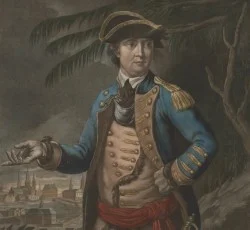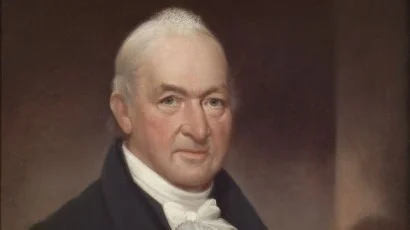During the American Revolution, British Major John André joined with American General Benedict Arnold in a scheme to secure British control over the American fortification at West Point, New York. Before it could be carried out, however, minutemen captured John André and informed General George Washington of the plot. Arnold managed to evade Washington's arrest warrant, but André was executed by Washington's order in October 1780.
Early Life
John André was born in London, England, on May 2, 1750 to a wealthy Huguenot family. Beyond his interests in the military, André was known as a poet and an artist. By 1771, André had joined the British Army and was sent to serve in Canada in 1774.
British Service in the American Revolution
André was captured by the Continental Army at Fort Saint-Jean early in the war. He was freed just over a year later in December of 1776 and promoted to captain. He fought in the battles of Brandywine and Germantown leading up to the British capture of Philadelphia, and kept a journal documenting those experiences. He served as the master of ceremonies for the "Meschianza" for British officers departing Philadelphia in the Spring of 1778. In November 1778, André was promoted to major and named adjutant general by General Henry Clinton, the British commander-in-chief. He socialized in upper-class circles of British occupied Philadelphia and New York.
At this point in the American Revolution, Clinton was aware of the significance of the American position at West Point. He knew that taking West Point would remove the Hudson River from colonial hands and force Washington's army into New Jersey. This would cut New England off from the rest of the colonies and leave the American-allied French army in the vicinity vulnerable to British capture.

As Clinton's adjutant general and in charge of British intelligence in North America, André corresponded with disenchanted American General Benedict Arnold, commander of West Point, to negotiate for West Point’s surrender. To ensure Arnold's cooperation in the scheme, André met with him on September 20, 1780. Arnold supplied André with a map of West Point and with Washington's war council minutes from September 6. He also provided André with a pass stating that André, using the undercover pseudonym John Anderson, was on business for Arnold and should be allowed free travel in the region.
Arrest and Execution
On September 23, André was returning to British lines when he was stopped by three members of the New York militia. The men interrogated André, whose answers, along with his pass from Arnold, aroused their suspicions. The men then searched André and discovered the map of West Point. André was arrested and transported to the nearest military post.
André's confiscated documents were then sent to General Washington. Before these materials reached Washington, however, the General was already making his way to visit Arnold. Not finding Arnold at home, Washington proceeded to the fort only to discover that Arnold had not fortified it as ordered. Returning to the Arnold residence, Washington received the confiscated André's papers and it became clear that the American cause had been betrayed. In a General Order on September 26, Washington announced André was taken prisoner and that the army was taking, “proper measure to unravel fully, so hellish a plot.”1
Washington ordered Arnold's arrest, but Arnold had already reached the safety of British lines. As for André, Washington organized a court of fourteen military generals led by Nathanael Greene to examine the case.2 After questioning the prisoner, the board decided that he should be executed as a spy. Some officers on the board such as the Marquis de Lafayette disagreed with the decision to execute him.3 Washington accepted this determination, though he offered the British the opportunity to save André's life by exchanging him for Arnold.
The British refused, believing it would dissuade others from deserting to the British cause. As a result, Washington ordered André's execution which took place on October 2, 1780 at Tappan, New York.4 The day before his execution, André wrote to Washington for “sympathy” and to request a more honorable death by firing squad, writing, “Let me hope Sir, that if ought in my Character impresses you with Esteem towards me, if ought in my Misfortunes marks me as the Victim of policy and not of resentment.”5 Ultimately, Washington denied this request and deferred to the decision made by the court marital, insisting that André hang for crime of espionage. News of his execution led to Anti-American sentiment in Britain.
T. K. Byron, Ph.D. Dalton State College, updated by Zoie Horecny, 22 May 2025
Notes:
1. “General Orders, 26 September 1780,” Founders Online, National Archives.
2. “George Washington to the Board of General Officers, 29 September 1780,” Founders Online, National Archives.
3. “From George Washington to General Henry Clinton, 30 September 1780,” Founders Online, National Archives.
4. “General Orders, 1 October 1780,” Founders Online, National Archives.
5. “To George Washington from Major John André, 1 October 1780,” Founders Online, National Archives.
Bibliography:
André, John and Cornelis De Witt Wilcox. Major André’s Journal: Operations of the British Army Under Lieutenant Generals Sir William Howe and Sir Henry Clinton, June, 177 to November, 1778, Recorded by Major John André, Adjutant General; to which is Added the Ethics of Major André’s Mission. Published by the University of Wisconsin, 1930.
Chernow, Ron. Washington: A Life. New York: Penguin, 2010.
Leckie, Robert. George Washington's War: The Saga of the American Revolution. New York: HarperCollins Publishers, 1992.
Palmer, Dave Richard. George Washington and Benedict Arnold: A Tale of Two Patriots. Washington, DC: Regnery Publishing, 2006.
Ronald, D. A. B. The Life of John André: The Redcoat Who Turned Benedict Arnold. Casemate Publishers, 2019.
Van Buskirk, Judith L. Generous Enemies: Patriots and Loyalists in Revolutionary New York. Philadelphia: University of Pennsylvania Press, 2002.
New York State Archives Photographic Collection. "Treason in New York."


